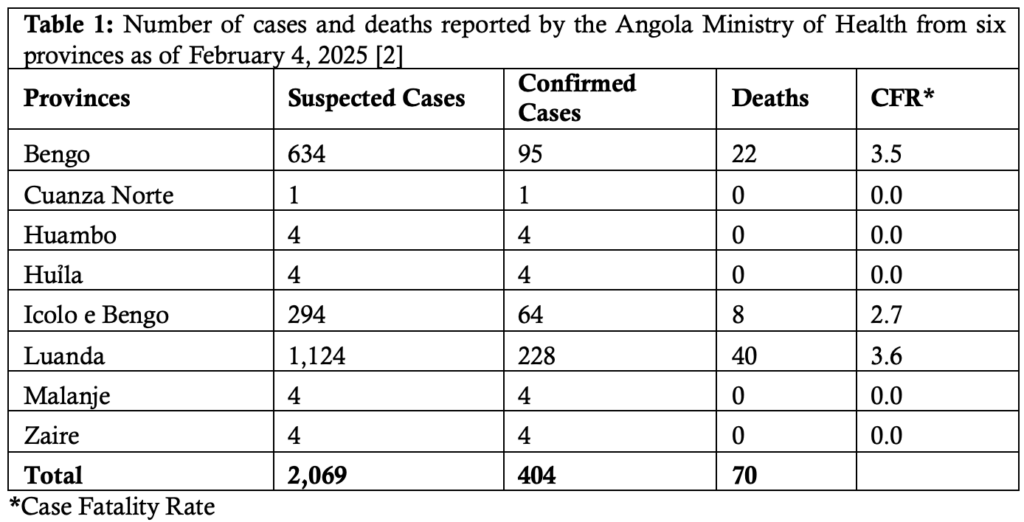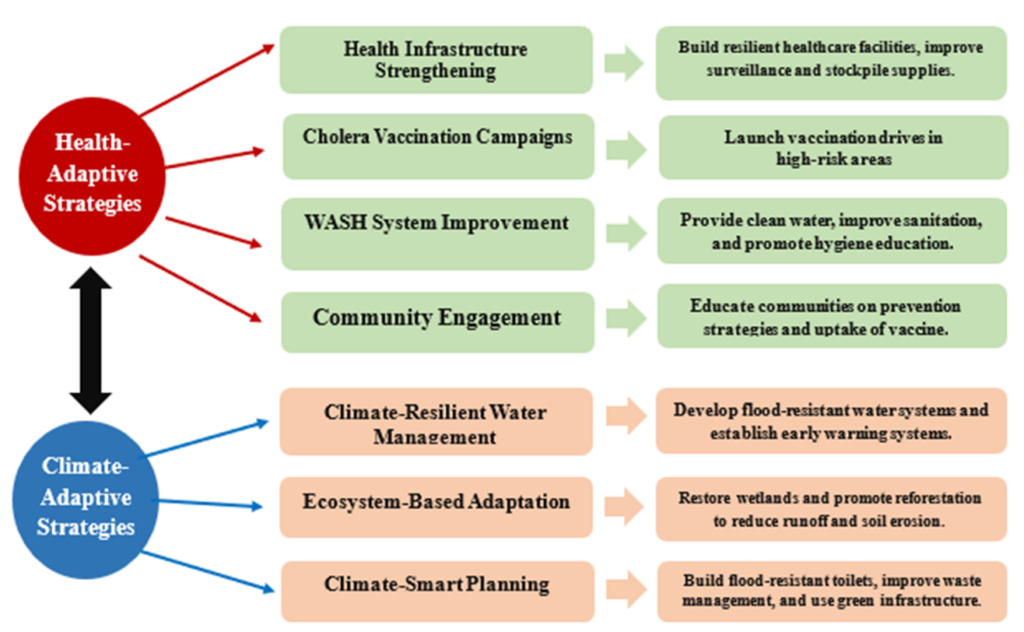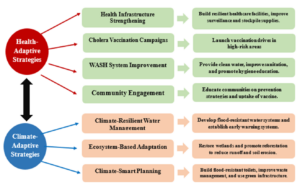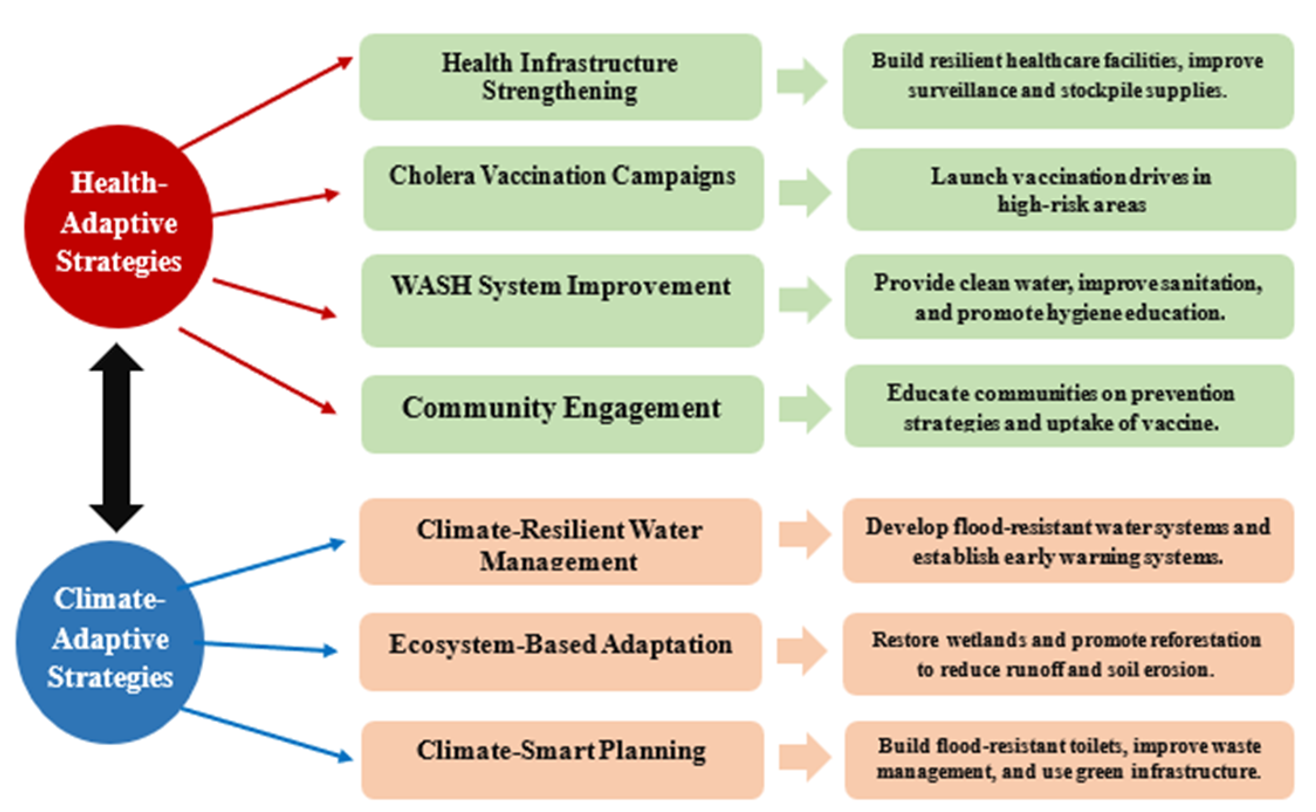Letter to the Editor![]() | Volume 8, Article 17, 8 Apr 2025
| Volume 8, Article 17, 8 Apr 2025
Strengthening climate and health adaptation strategies to combat cholera in Angola and beyond
Abdulrakib Abdulrahim1, Valdemiro Amilton Rafael2, Bashar Haruna Gulumbe3, Victor Abiola Adepoju4, Safayet Jamil5,6
1Department of Medical Microbiology, Faculty of Medicine and Health Sciences, Universiti Putra Malaysia, Serdang, Selangor, Malaysia, 2Departament of Health, Joṡe Eduardo dos Santos University, Huambo, Angola, 3Department of Microbiology, Faculty of Science, Federal University, Birnin Kebbi, Birnin Kebbi, Kebbi State, Nigeria, 4Department of HIV and Infectious Diseases, Jhpiego, (an affiliate of Johns Hopkins University) Abuja, Nigeria, 5Department of Public Health, Daffodil International University, Dhaka, Bangladesh, 6Department of Public and Community Health, Faculty of Medicine and Health Sciences, Frontier University Garowe, Somalia.
&Corresponding author: Abdulrakib Abdulrahim. Department of Medical Microbiology, Faculty of Medicine and Health Sciences, Universiti Putra Malaysia, Serdang, Selangor, Malaysia, Email: abdulrakib161@gmail.com
Dear Editor,
As the new year begins, Angola faces a distressing surge in cholera cases [1] Da Ascensão Gonçalves MA, Lopes Ribeiro Júnior H. Angola’s cholera outbreak: a wake-up call for global action. The Lancet [Internet]. 2025 Feb 22 [cited 2025 Apr 6];405(10479):620–1. Available from: https://linkinghub.elsevier.com/retrieve/pii/S0140673625002405 https://doi.org/10.1016/S0140-6736(25)00240-5
. On January 8, 2025, the Ministry of Health officially declared an outbreak. By February 4, a total of 2,069 suspected cases and 404 confirmed cases had been documented, with 70 deaths reported accounting for a case fatality rate of 3.4% across eight of the country’s 18 provinces [1]
Da Ascensão Gonçalves MA, Lopes Ribeiro Júnior H. Angola’s cholera outbreak: a wake-up call for global action. The Lancet [Internet]. 2025 Feb 22 [cited 2025 Apr 6];405(10479):620–1. Available from: https://linkinghub.elsevier.com/retrieve/pii/S0140673625002405 https://doi.org/10.1016/S0140-6736(25)00240-5
,[2]
WHO Regional Office for Africa, Ministry of Health (Angola). Boletim informativo da cólera Nº 28/2025 [Cholera Bulletin 2024 No. 28] [Internet]. Luanda (Angola): Ministry of Health; 2025 Feb 4 [cited 2025 Apr 6]. [2 p.]. Portuguese. Available from: https://www.afro.who.int/pt/countries/angola/publication/boletim-de-colera-2024-no-28 Download PDF to view full text.
. This number of fatalities has surpassed the last major outbreaks in 2016 and 2017, which claimed a total of 11 lives [3]
WHO Regional Office for Africa, Ministry of Health (Angola). Boletim informativo da cólera Nº 25/2025 [Cholera Bulletin 2024 No. 28] [Internet]. Luanda (Angola): Ministry of Health; 2025 Feb 1 [cited 2025 Apr 6]. [2 p.]. Portuguese. Available from: https://www.afro.who.int/sites/default/files/2025-02/BOLETIM%20CO%CC%81LERA%2025.pdf Download PDF to view full text.
. Luanda, the capital, recorded the highest morbidity and mortality, with 1,124 cases and 40 deaths (Table 1) [2]
WHO Regional Office for Africa, Ministry of Health (Angola). Boletim informativo da cólera Nº 28/2025 [Cholera Bulletin 2024 No. 28] [Internet]. Luanda (Angola): Ministry of Health; 2025 Feb 4 [cited 2025 Apr 6]. [2 p.]. Portuguese. Available from: https://www.afro.who.int/pt/countries/angola/publication/boletim-de-colera-2024-no-28 Download PDF to view full text.
. This outbreak has been linked to poor sanitation, limited access to clean water, and overburdened healthcare systems. Flooding has also been identified as a risk factor that further exacerbates the transmission of the infection during this outbreak, with children and women being the most affected populations [1]
Da Ascensão Gonçalves MA, Lopes Ribeiro Júnior H. Angola’s cholera outbreak: a wake-up call for global action. The Lancet [Internet]. 2025 Feb 22 [cited 2025 Apr 6];405(10479):620–1. Available from: https://linkinghub.elsevier.com/retrieve/pii/S0140673625002405 https://doi.org/10.1016/S0140-6736(25)00240-5
,[4]
UNICEF. Angola Cholera Outbreak Situation report #3 [Internet]. New York (NY): UNICEF; 2025 Feb 17 [cited 2025 Apr 6]. [3 p.]. Available from: https://www.unicef.org/media/167891/file/UNICEF%20Angola%20Situation%20Report%20No.%203%20(Cholera%20Outbreak)%20-%2017%20February%202025.pdf.pdf Download PDF to view full text
. Therefore, this letter highlights the urgent need to build climate-resilient environments and healthcare systems, with a focus on mitigating flooding, improving water, sanitation, and hygiene (WASH), and strengthening public health responses in Angola and across Africa.
Cholera, often referred to as a ‘disease of poverty,’ is currently classified as a disease of very high risk globally [5]
WHO. Multi-country cholera outbreak, external situation report #23 -20 February 2025 [Internet]. Geneva (Switzerland): WHO; 2025 Feb 20 [cited 2025 Apr 6]. 12 p. Available from: https://www.who.int/publications/m/item/multi-country-cholera-outbreak–external-situation-report–23–20-february-2025 Download PDF to view full text.
,[6]
UN News. Global cholera surge likely accelerated by climate change, warns WHO [Internet]. New York (NY): United Nations; 2022 Dec 16 [cited 2025 Apr 6]. Available from: https://news.un.org/en/story/2022/12/1131787
. It is widely recognized as an epidemic in Africa, with significant numbers of cases and deaths reported each year [5]
WHO. Multi-country cholera outbreak, external situation report #23 -20 February 2025 [Internet]. Geneva (Switzerland): WHO; 2025 Feb 20 [cited 2025 Apr 6]. 12 p. Available from: https://www.who.int/publications/m/item/multi-country-cholera-outbreak–external-situation-report–23–20-february-2025 Download PDF to view full text.
,[7]
Girotto CD, Behzadian K, Musah A, Chen AS, Djordjević S, Nichols G, Campos LC. Analysis of environmental factors influencing endemic cholera risks in sub-Saharan Africa. Science of The Total Environment [Internet]. 2024 Mar 20 [version of record 2024 Mar 30; cited 2025 Apr 6];926:171896. Available from: https://linkinghub.elsevier.com/retrieve/pii/S0048969724020394 https://doi.org/10.1016/j.scitotenv.2024.171896
. This diarrheal infection is transmitted through the ingestion of contaminated food or water [3]
WHO Regional Office for Africa, Ministry of Health (Angola). Boletim informativo da cólera Nº 25/2025 [Cholera Bulletin 2024 No. 28] [Internet]. Luanda (Angola): Ministry of Health; 2025 Feb 1 [cited 2025 Apr 6]. [2 p.]. Portuguese. Available from: https://www.afro.who.int/sites/default/files/2025-02/BOLETIM%20CO%CC%81LERA%2025.pdf Download PDF to view full text.
,[7]
Girotto CD, Behzadian K, Musah A, Chen AS, Djordjević S, Nichols G, Campos LC. Analysis of environmental factors influencing endemic cholera risks in sub-Saharan Africa. Science of The Total Environment [Internet]. 2024 Mar 20 [version of record 2024 Mar 30; cited 2025 Apr 6];926:171896. Available from: https://linkinghub.elsevier.com/retrieve/pii/S0048969724020394 https://doi.org/10.1016/j.scitotenv.2024.171896
. According to a recent report published by the World Health Organization (WHO) on 20th February 2025, 34,799 cases and 349 deaths were reported due to cholera globally between 1st January 2025 and 26th January 2025 across 19 countries. The report also highlighted that approximately one billion people are at risk of infection [5]
WHO. Multi-country cholera outbreak, external situation report #23 -20 February 2025 [Internet]. Geneva (Switzerland): WHO; 2025 Feb 20 [cited 2025 Apr 6]. 12 p. Available from: https://www.who.int/publications/m/item/multi-country-cholera-outbreak–external-situation-report–23–20-february-2025 Download PDF to view full text.
. Africa region had the most affected countries, accounting for 51% of the cases followed by Eastern Mediterranean region [5]
WHO. Multi-country cholera outbreak, external situation report #23 -20 February 2025 [Internet]. Geneva (Switzerland): WHO; 2025 Feb 20 [cited 2025 Apr 6]. 12 p. Available from: https://www.who.int/publications/m/item/multi-country-cholera-outbreak–external-situation-report–23–20-february-2025 Download PDF to view full text.
Climate change is known to exacerbate the spread of infectious diseases [8]
Kaseya J, Dereje N, Tajudeen R, Ngongo AN, Ndembi N, Fallah MP. Climate change and malaria, dengue and cholera outbreaks in Africa: a call for concerted actions. BMJ Glob Health [Internet]. 2024 Mar 7 [cited 2025 Apr 6];9(3):e015370. Available from: https://gh.bmj.com/lookup/doi/10.1136/bmjgh-2024-015370 https://doi.org/10.1136/ bmjgh-2024-015370
,[9]
World Meteorological Organization (WMO), United Nations Office for Disaster Risk Reduction (UNDRR). Global Status of Multi-Hazard Early Warning Systems: 2024 [Internet]. Geneva (Switzerland): WMO; 2024 [cited 2025 Apr 6]. 180 p. Available from: https://library.wmo.int/records/item/69085-global-status-of-multi-hazard-early-warning-systems-2024 Download PDF to view full text
. WHO identified climate change as the driver of an unprecedented surge in the numbers of cholera outbreaks across the globe [6]
UN News. Global cholera surge likely accelerated by climate change, warns WHO [Internet]. New York (NY): United Nations; 2022 Dec 16 [cited 2025 Apr 6]. Available from: https://news.un.org/en/story/2022/12/1131787
. Numerous climate change-related factors such as flooding, cyclones and monsoons have been linked to an increased risk of cholera [6]
UN News. Global cholera surge likely accelerated by climate change, warns WHO [Internet]. New York (NY): United Nations; 2022 Dec 16 [cited 2025 Apr 6]. Available from: https://news.un.org/en/story/2022/12/1131787
,[8]
Kaseya J, Dereje N, Tajudeen R, Ngongo AN, Ndembi N, Fallah MP. Climate change and malaria, dengue and cholera outbreaks in Africa: a call for concerted actions. BMJ Glob Health [Internet]. 2024 Mar 7 [cited 2025 Apr 6];9(3):e015370. Available from: https://gh.bmj.com/lookup/doi/10.1136/bmjgh-2024-015370 https://doi.org/10.1136/ bmjgh-2024-015370
. These risks include exposure to contaminated water sources, population displacement leading to overcrowded and unsanitary conditions, and the destruction of infrastructure, such as water and healthcare systems. Africa is particularly vulnerable to the impacts of climate change, which continues to worsen public health challenges in the region, especially for vulnerable groups such as children, women, and those living in poverty [8]
Kaseya J, Dereje N, Tajudeen R, Ngongo AN, Ndembi N, Fallah MP. Climate change and malaria, dengue and cholera outbreaks in Africa: a call for concerted actions. BMJ Glob Health [Internet]. 2024 Mar 7 [cited 2025 Apr 6];9(3):e015370. Available from: https://gh.bmj.com/lookup/doi/10.1136/bmjgh-2024-015370 https://doi.org/10.1136/ bmjgh-2024-015370
,[9]
World Meteorological Organization (WMO), United Nations Office for Disaster Risk Reduction (UNDRR). Global Status of Multi-Hazard Early Warning Systems: 2024 [Internet]. Geneva (Switzerland): WMO; 2024 [cited 2025 Apr 6]. 180 p. Available from: https://library.wmo.int/records/item/69085-global-status-of-multi-hazard-early-warning-systems-2024 Download PDF to view full text
. Multi-hazard early warning systems remain limited in Africa, and it is the only region where no country has demonstrated comprehensive risk assessment and management capacities [9]
World Meteorological Organization (WMO), United Nations Office for Disaster Risk Reduction (UNDRR). Global Status of Multi-Hazard Early Warning Systems: 2024 [Internet]. Geneva (Switzerland): WMO; 2024 [cited 2025 Apr 6]. 180 p. Available from: https://library.wmo.int/records/item/69085-global-status-of-multi-hazard-early-warning-systems-2024 Download PDF to view full text
. Earlier, Angola’s meteorological agency forecasted higher-than-usual rainfall for the current rainy season, which could lead to flooding. The Africa Centers for Disease Control and Prevention has identified this issue, along with delays in accessing medical care, as one of the potential challenges during the ongoing cholera outbreak in Angola [3]
WHO Regional Office for Africa, Ministry of Health (Angola). Boletim informativo da cólera Nº 25/2025 [Cholera Bulletin 2024 No. 28] [Internet]. Luanda (Angola): Ministry of Health; 2025 Feb 1 [cited 2025 Apr 6]. [2 p.]. Portuguese. Available from: https://www.afro.who.int/sites/default/files/2025-02/BOLETIM%20CO%CC%81LERA%2025.pdf Download PDF to view full text.
,[10]
Africa-CDC. Special briefing on Mpox & other health emergencies| Jan. 23, 2025 [Internet]. Addis Ababa (ET): Africa CDC; 2025 Jan 23 [cited 2025 Apr 6]. Video: 57 min Available from: https://www.youtube.com/live/CH1_n-gFWG0?si=xiidaJviU20oThNR
. At this pivotal moment, there is an urgent and significant need for Africa, including Angola’s healthcare system, to build a climate- and health-resilient environment (Figure 1). This can be achieved through wide-ranging support and funding from global communities, countries, donors, and the private sector [8]
Kaseya J, Dereje N, Tajudeen R, Ngongo AN, Ndembi N, Fallah MP. Climate change and malaria, dengue and cholera outbreaks in Africa: a call for concerted actions. BMJ Glob Health [Internet]. 2024 Mar 7 [cited 2025 Apr 6];9(3):e015370. Available from: https://gh.bmj.com/lookup/doi/10.1136/bmjgh-2024-015370 https://doi.org/10.1136/ bmjgh-2024-015370
. However, this effort is complicated by growing challenges in securing support from high-income country donors. Withdrawal from climate agreements could raise significant concerns about their potential impact on coordinated efforts to address public health challenges in Africa and other parts of the Global South. These actions could leave the continent without or reduce the necessary financial and technical support to address public health challenges.
Notwithstanding, Africa needs to find ways to contain the recurring public health challenges. Authorities, including health and environmental scientists as well as disaster managers, must collaborate more closely to share ideas and strategies aimed at achieving the common goal of mitigating the cholera crisis in Africa. Similarly, funding is key in achieving this; the African region must expand its reach through partnerships with local and international organizations.
The need for public education campaigns and sensitization cannot be overemphasized. Face-to-face and social media initiatives targeting schools, religious centers, parks, and markets are needed to promote a culture of disease prevention, mitigation, and response, as well as flood preparedness in both rural and urban areas. Furthermore, the need for data-driven decision-making is equally vital, as it aids in predicting, understanding, and monitoring diseases. Its cost-effectiveness and ability to generate insights quickly make it a critical tool during epidemics and emergencies [11]
Pezanowski S, Koua EL, Okeibunor JC, Gueye AS. Predictors of disease outbreaks at continental-scale in the African region: Insights and predictions with geospatial artificial intelligence using earth observations and routine disease surveillance data. Digital Health [Internet]. 2024 Nov 5 [cited 2025 Apr 6];10:20552076241278939. Available from: https://journals.sagepub.com/doi/10.1177/20552076241278939 https://doi.org/10.1177/20552076241278939
. Vaccination, along with other critical cholera prevention and treatment measures such as ensuring access to rehydration therapy and improving WASH infrastructure must also be prioritized. Empowering Africa’s public health sector is crucial for building a resilient future. Together, we can lead the charge in safeguarding our communities, preventing diseases, and creating lasting health solutions for generations to come.


References
- Da Ascensão Gonçalves MA, Lopes Ribeiro Júnior H. Angola’s cholera outbreak: a wake-up call for global action. The Lancet [Internet]. 2025 Feb 22 [cited 2025 Apr 6];405(10479):620–1. Available from: https://doi.org/10.1016/S0140-6736(25)00240-5
- WHO Regional Office for Africa, Ministry of Health (Angola). Boletim informativo da cólera Nº 28/2025 [Cholera Bulletin 2024 No. 28] [Internet]. Luanda (Angola): Ministry of Health; 2025 Feb 4 [cited 2025 Apr 6]. [2 p.]. Portuguese. Available from: Download PDF to view full text.
- WHO Regional Office for Africa, Ministry of Health (Angola). Boletim informativo da cólera Nº 25/2025 [Cholera Bulletin 2024 No. 28] [Internet]. Luanda (Angola): Ministry of Health; 2025 Feb 1 [cited 2025 Apr 6]. [2 p.]. Portuguese. Available from: Download PDF to view full text.
- UNICEF. Angola Cholera Outbreak Situation report #3 [Internet]. New York (NY): UNICEF; 2025 Feb 17 [cited 2025 Apr 6]. [3 p.]. Available from: Download PDF to view full text.
- WHO. Multi-country cholera outbreak, external situation report #23 -20 February 2025 [Internet]. Geneva (Switzerland): WHO; 2025 Feb 20 [cited 2025 Apr 6]. 12 p. Available from: Download PDF to view full text.
- UN News. Global cholera surge likely accelerated by climate change, warns WHO [Internet]. New York (NY): United Nations; 2022 Dec 16 [cited 2025 Apr 6]. Available from:
- Girotto CD, Behzadian K, Musah A, Chen AS, Djordjević S, Nichols G, Campos LC. Analysis of environmental factors influencing endemic cholera risks in sub-Saharan Africa. Science of The Total Environment [Internet]. 2024 Mar 20 [version of record 2024 Mar 30; cited 2025 Apr 6];926:171896. Available from: https://doi.org/10.1016/j.scitotenv.2024.171896
- Kaseya J, Dereje N, Tajudeen R, Ngongo AN, Ndembi N, Fallah MP. Climate change and malaria, dengue and cholera outbreaks in Africa: a call for concerted actions. BMJ Glob Health [Internet]. 2024 Mar 7 [cited 2025 Apr 6];9(3):e015370. Available from: https://doi.org/10.1136/bmjgh-2024-015370
- World Meteorological Organization (WMO), United Nations Office for Disaster Risk Reduction (UNDRR). Global Status of Multi-Hazard Early Warning Systems: 2024 [Internet]. Geneva (Switzerland): WMO; 2024 [cited 2025 Apr 6]. 180 p. Available from: Download PDF to view full text.
- Africa-CDC. Special briefing on Mpox & other health emergencies| Jan. 23, 2025 [Internet]. Addis Ababa (ET): Africa CDC; 2025 Jan 23 [cited 2025 Apr 6]. Video: 57 min Available from:
- Pezanowski S, Koua EL, Okeibunor JC, Gueye AS. Predictors of disease outbreaks at continental-scale in the African region: Insights and predictions with geospatial artificial intelligence using earth observations and routine disease surveillance data. Digital Health [Internet]. 2024 Nov 5 [cited 2025 Apr 6];10:20552076241278939. Available from: https://doi.org/10.1177/20552076241278939
Menu, Tables and figures
Navigate this article
Tables

Figures

Figure 1: Climate-Resilient and Health-Adaptive Strategies to Combat Cholera

Keywords
- Waterborne disease
- Environmental change
- Angola
- Africa
- Endemic
